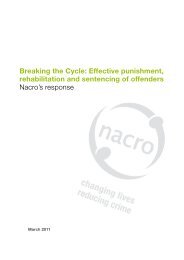Applying for work (with a criminal record): resettlement - Nacro
Applying for work (with a criminal record): resettlement - Nacro
Applying for work (with a criminal record): resettlement - Nacro
Create successful ePaper yourself
Turn your PDF publications into a flip-book with our unique Google optimized e-Paper software.
employment where accuracy, organisation<br />
and attention to detail are of the essence.<br />
� Work <strong>with</strong> others. When drafting<br />
applications and preparing <strong>for</strong> interviews,<br />
applicants should <strong>work</strong> <strong>with</strong> others to see<br />
whether what they plan to say to an<br />
employer is what the employer is looking<br />
<strong>for</strong>. There is usually something to be<br />
gained by discussing drafts and<br />
<strong>for</strong>thcoming interviews <strong>with</strong> third parties,<br />
especially those people who can be<br />
objective.<br />
� Get out and about. Many jobs are not<br />
advertised and recruitment takes place<br />
in<strong>for</strong>mally rather than through the<br />
completion of an application <strong>for</strong>m. The<br />
more ef<strong>for</strong>t people put into maintaining<br />
contact <strong>with</strong> friends, relatives and <strong>for</strong>mer<br />
colleagues, the more likely they are to<br />
secure employment. Training and voluntary<br />
<strong>work</strong> can be a useful route into <strong>work</strong>.<br />
� Prepare properly <strong>for</strong> any interview. If<br />
the applicant gets an interview, their<br />
chances of getting the job will<br />
significantly increase. They can increase<br />
them further by preparing properly.<br />
Applicants should make sure that they<br />
know where the interview will take place<br />
and that they can get there in good time.<br />
They should think about the questions<br />
that might be asked and put themselves<br />
in a frame of mind to answer them clearly<br />
and confidently. If they have a job<br />
description, the questions may be based<br />
on the person specification or they may<br />
be more general, such as ‘Why do you<br />
want this job?’, ‘Why did you leave your<br />
last job?’ or ‘Tell me more about yourself’.<br />
Interviewees should dress smartly.<br />
Through proper preparation, applicants<br />
should be able to go into the interview<br />
<strong>with</strong> confidence, which is important as<br />
first impressions count.<br />
� Know the organisation. They can<br />
further improve their chances by learning<br />
more about the employer, finding out<br />
what they do, what they believe in, and<br />
so on, and then using this knowledge in<br />
the interview. If the employer is a large<br />
firm, a statutory body or<br />
charity/voluntary organisation, they may<br />
well have an annual report and brochures<br />
they can send them. Applicants can<br />
phone up and request these – or check if<br />
the prospective employer has a website.<br />
Resettlement practitioner guide <strong>Applying</strong> <strong>for</strong> <strong>work</strong><br />
Part 5 Still can’t get a job?<br />
If despite this guidance, people find over time<br />
that they cannot secure employment, then they<br />
should consider further measures to improve their<br />
prospects. It may be that they are not getting<br />
interviews because their <strong>record</strong> is so serious that,<br />
no matter what assurance they provide, the<br />
employer cannot get beyond it. This is especially<br />
likely to be the case if the person has been<br />
convicted of a sexual offence. Most employers<br />
will not knowingly employ a sexual offender: nine<br />
out of ten employers will reject them outright.<br />
It may however be a combination of a <strong>criminal</strong><br />
<strong>record</strong> and other factors such as a long bout of<br />
unemployment, lack of confidence or skills,<br />
homelessness or chaotic lifestyle, that will<br />
prevent some ex-offenders from securing<br />
employment. If this is the case, people should<br />
consider training or voluntary <strong>work</strong>. As well as<br />
boosting their self-confidence and self-esteem,<br />
training or voluntary <strong>work</strong> will take off some of<br />
the pressure to find paid employment.<br />
If ex-offenders were to get on to a good training<br />
scheme they might find that, in addition to<br />
learning new skills, they will be <strong>work</strong>ing <strong>with</strong><br />
staff who might be able to advocate on their<br />
behalf and/or secure a placement <strong>with</strong> an<br />
employer. This will in some instances lead to<br />
permanent employment. Once they have that first<br />
job, it will be easier to secure subsequent jobs,<br />
assuming that they prove to be good, reliable<br />
employees.<br />
They may be able to join a training scheme under<br />
the Government’s New Deal programme, which is<br />
administered by local jobcentres. They should<br />
make enquiries at their local jobcentre.<br />
Voluntary <strong>work</strong> can often enable people to<br />
improve their skills, provides a reference post<br />
conviction and, most importantly, gets them out<br />
and about, enabling them to make contact <strong>with</strong><br />
others who might be able to recommend them <strong>for</strong><br />
a job. Around four out of ten people find <strong>work</strong><br />
through personal contacts. The importance of<br />
personal contacts and social net<strong>work</strong>s there<strong>for</strong>e<br />
should not be underestimated, especially when<br />
employers’ attitudes to ex-offenders are taken<br />
into account.<br />
People can find out about local volunteering<br />
opportunities through their local volunteer<br />
office, adverts in local papers and in The<br />
Guardian on Wednesdays. They may also be able<br />
to undertake volunteer <strong>work</strong> under the New Deal<br />
programme.<br />
7

















